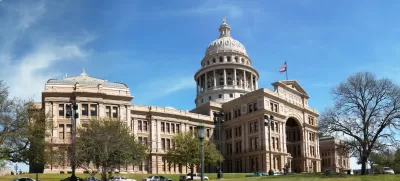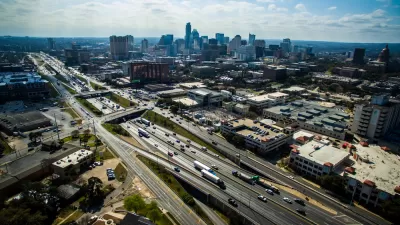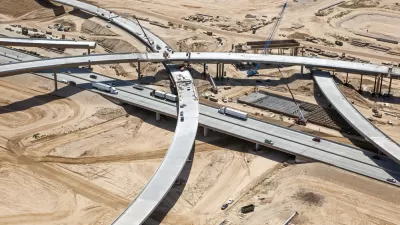In a landmark, unanimous vote, the Texas Transportation Commission eliminated all 15 express lane projects from their 10-year capital plan despite pleas from Austin area officials to retain the $8 billion, I-35 project that includes four toll lanes.

The Texas Transportation Commissioner was reacting to pressure from Gov. Greg Abbott and Lt. Gov. Dan Patrick to not spend funds from statewide propositions passed by voters in 2014 and 2015 on express lanes. Both ballot measure prohibited spending the funds on toll lanes.
"That 5-0 vote came despite the pleas of nearly a dozen Central Texas political, civic and business leaders — including Austin Mayor Steve Adler, Sen. Kirk Watson [D-Austin], Travis County Commissioner Gerald Daugherty and Capital Metro board chairman Wade Cooper — to keep the I-35 express lanes in the plan," reports Ben Wear on Dec. 14, the same day as the vote, for the Austin American-Statesman.
“A vote today to exclude I-35 from the (10-year plan) is a mistake that will take Texas into a future of worsening gridlock,” Watson wrote in a letter read to the Texas Transportation Commission.
A bus rapid transit project would operate on the I-35 express lanes according to a proposal by the Capital Metropolitan Transportation Authority last July.
The elected officials and leaders in the Austin area wanted "to use every tool in the toolbox to mitigate traffic congestion," reported Amy Denney for Community Impact Newspaper.
“I’m disappointed that politics trumped congestion relief today,” state Rep. Celia Israel, D-Austin, said in a statement. “From Williamson to Hays [counties], the gridlock we face is unsustainable, and the decision to leave the status quo in place does not help.”
While the I-35 express lane project and a $2 billion expansion of the LBJ TEXpress Lanes on I-635 in Dallas received the most attention, Adler writes that the commission had been expected to have a total of 15 toll lane projects in the long-term plan.
But the commission was under great pressure from Abbott and Patrick, who in turn were reacting to conservative, anti-toll activists who had argued that Texas voters assumed new toll projects would cease when they approved two constitutional amendments directing more tax dollars to TxDOT. Those amendments specified that influx of money could not be used to build toll lanes.
It should be noted that neither Proposition 1 in 2014 nor Proposition 7 in 2015 raised new revenue. Both are prime examples of tax diversion from existing sources to the State Highway Fund to be used exclusively for untolled roads and transportation debt reduction. The former diverted funds from the state Rainy Day Fund while Prop 7 diverted sales and use tax revenue and motor vehicle sales, use, and rental tax.
"Travis County Commissioner Gerald Daugherty said it concerns him that many residents still believe voter-approved propositions 1 and 7 money are enough to fully fund all transportation needs in the state," adds Denney.
“Managed lanes I think are a wonderful tool to have to help us deal with [congestion],” he said.
However, there remains a strong sense of entitlement among motorists that roads should be "free", particularly after they voted to spend additional money on them, even if the ballot measures only diverted funds rather than increased taxes. The state's 20-cent per gallon gas tax was last raised in 1991, almost 27 years ago. It's 40 percent lower than the average state gas tax of 33.33 cents per gallon.
Hat tip to AASHTO Daily Transportation Update.
FULL STORY: I-35 toll lanes in Austin cut from long-range transportation plan

Maui's Vacation Rental Debate Turns Ugly
Verbal attacks, misinformation campaigns and fistfights plague a high-stakes debate to convert thousands of vacation rentals into long-term housing.

Planetizen Federal Action Tracker
A weekly monitor of how Trump’s orders and actions are impacting planners and planning in America.

In Urban Planning, AI Prompting Could be the New Design Thinking
Creativity has long been key to great urban design. What if we see AI as our new creative partner?

How Trump's HUD Budget Proposal Would Harm Homelessness Response
Experts say the change to the HUD budget would make it more difficult to identify people who are homeless and connect them with services, and to prevent homelessness.

The Vast Potential of the Right-of-Way
One writer argues that the space between two building faces is the most important element of the built environment.

Florida Seniors Face Rising Homelessness Risk
High housing costs are pushing more seniors, many of them on a fixed income, into homelessness.
Urban Design for Planners 1: Software Tools
This six-course series explores essential urban design concepts using open source software and equips planners with the tools they need to participate fully in the urban design process.
Planning for Universal Design
Learn the tools for implementing Universal Design in planning regulations.
Gallatin County Department of Planning & Community Development
Heyer Gruel & Associates PA
JM Goldson LLC
City of Camden Redevelopment Agency
City of Astoria
Transportation Research & Education Center (TREC) at Portland State University
Jefferson Parish Government
Camden Redevelopment Agency
City of Claremont




























